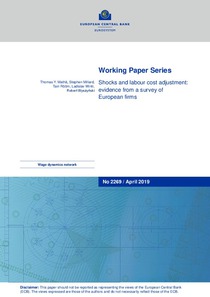Shocks and labour cost adjustment: evidence from a survey of European firms
"We use firm-level survey data from 25 EU countries to analyse how firms adjust their labour costs (employment, wages and hours) in response to shocks. We develop a theoretical model to understand how firms choose between different ways to adjust their labour costs. The basic intuition is that...
| Main Authors: | , , , , |
|---|---|
| Institution: | ETUI-European Trade Union Institute |
| Format: | TEXT |
| Language: | English |
| Published: |
Frankfurt am Main
2019
ECB |
| Subjects: | |
| Online Access: | https://www.labourline.org/KENTIKA-19307735124911259179-Shocks-and-labour-cost-adjustm.htm |
| _version_ | 1771659901823614978 |
|---|---|
| author | Mathä, Thomas Millard, Stephen Rõõm, Tairi Wintr, Ladislav Wyszynski, Robert |
| author_facet | Mathä, Thomas Millard, Stephen Rõõm, Tairi Wintr, Ladislav Wyszynski, Robert |
| collection | Library items |
| description | "We use firm-level survey data from 25 EU countries to analyse how firms adjust their labour costs (employment, wages and hours) in response to shocks. We develop a theoretical model to understand how firms choose between different ways to adjust their labour costs. The basic intuition is that firms choose the cheapest way to adjust labour costs. Our empirical findings are in line with the theoretical model and show that the pattern of adjustment is not much affected by the type of the shock (demand shock, access-to-finance shock, ‘availability of supplies’ shock), but differs according to the direction of the shock (positive or negative), its size and persistence. In 2010-13, firms responding to negative shocks were most likely to reduce employment, then hourly wages and then hours worked, regardless of the source of the shock. Results for the 2008-09 period indicate that the ranking might change during deep recession as the likelihood of wage cuts increases. In response to positive shocks in 2010-13, firms were more likely to increase wages, followed by increases in employment and then hours worked suggesting an asymmetric reaction to positive and negative shocks. Finally, we show that strict employment protection legislation and high centralisation or coordination of wage bargaining make it less likely that firms reduce wages when facing negative shocks." |
| format | TEXT |
| geographic | EU countries |
| id | 19307735124911259179_6b54342dc5f143639e915db54897aaa0 |
| institution | ETUI-European Trade Union Institute |
| is_hierarchy_id | 19307735124911259179_6b54342dc5f143639e915db54897aaa0 |
| is_hierarchy_title | Shocks and labour cost adjustment: evidence from a survey of European firms |
| language | English |
| physical | 42 p. Digital |
| publishDate | 2019 |
| publisher | Frankfurt am Main ECB |
| spellingShingle | Mathä, Thomas Millard, Stephen Rõõm, Tairi Wintr, Ladislav Wyszynski, Robert labour cost business cycle enterprise level Shocks and labour cost adjustment: evidence from a survey of European firms |
| thumbnail | https://www.labourline.org/Image_prev.jpg?Archive=138283595646 |
| title | Shocks and labour cost adjustment: evidence from a survey of European firms |
| topic | labour cost business cycle enterprise level |
| url | https://www.labourline.org/KENTIKA-19307735124911259179-Shocks-and-labour-cost-adjustm.htm |

